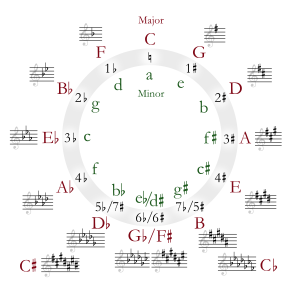This is an old revision of this page, as edited by Anomaly1 (talk | contribs) at 19:07, 17 September 2006 (→Well-known Classical Works in this key). The present address (URL) is a permanent link to this revision, which may differ significantly from the current revision.
Revision as of 19:07, 17 September 2006 by Anomaly1 (talk | contribs) (→Well-known Classical Works in this key)(diff) ← Previous revision | Latest revision (diff) | Newer revision → (diff) | |
| Relative key | E♭ major |
|---|---|
| Parallel key | C major |
| Component pitches | |
| C, D, E♭, F, G, A♭, B | |
C minor (abbreviated Cm) is a minor scale based on C, consisting of the pitches C, D, E-flat, F, G, A-flat, B and C (harmonic minor scale). Its key signature consists of three flats.
In the Baroque period, music in C minor was usually written with a two-flat key signature, and some modern editions of that repertoire keep it that way.
Its relative key is E-flat major, and its parallel major is C major.
Changes needed for the melodic and harmonic versions of the scale are written in with accidentals as necessary.
Of the two piano concertos that Mozart wrote in a minor key, one of them is in C minor, No. 24, K. 491.
C minor has been associated with heroic struggle since Beethoven's time, with the quintessential work in the key being his Symphony No. 5; see Beethoven and C minor. The fact that Brahms's Symphony No. 1 is in C minor contributed to it being nicknamed "Beethoven's Tenth" (the actual Beethoven Tenth may have had a significant central C minor section in the first movement). Three of Anton Bruckner's ten numbered symphonies are in C minor.
Well-known Classical Works in this key
- Symphony no. 5 - Ludwig Van Beethoven
- Piano Sonata no. 8 "Pathetique" - Ludwig Van Beethoven
- Piano Sonata no. 32 - Ludwig Van Beethoven
- "Revolutionary Etude" - Frederic Chopin
- Symphony no. 8 - Anton Bruckner
- Symphony no. 4 "Tragic" - Franz Schubert
- Piano Concerto no. 2 - Sergei Rachmaninov
- Cello Suite no. 5 - Johann Sebastian Bach
- Piano Concerto no. 24 - Wolfgang Amadeus Mozart
- Symphony no. 1 - Johannes Brahms
- String Quartet No. 8 - Dmitri Shostakovich
Well-known songs in this key
- ...Baby One More Time - Britney Spears
- (You Drive Me) Crazy - Britney Spears
- Over - Lindsay Lohan
- Fly Robin Fly - Silver Convention
- Just One Fix - Ministry
- Ride Like the Wind - Christopher Cross
- Die Another Day - Madonna
- Toxicity - System of a Down
- Since I've Been Loving You - Led Zeppelin
- A View to a Kill - Duran Duran
- Sweet Dreams - Eurythmics
- (Shake, Shake, Shake) Shake Your Booty - KC and the Sunshine Band
- Sorry - Madonna
- Vivir - Belinda
- Crazy - Gnarls Barkley
| Diatonic scales and keys | |||||||||||||||||||||||||||||||||||||||||||||||||||||||||||
|---|---|---|---|---|---|---|---|---|---|---|---|---|---|---|---|---|---|---|---|---|---|---|---|---|---|---|---|---|---|---|---|---|---|---|---|---|---|---|---|---|---|---|---|---|---|---|---|---|---|---|---|---|---|---|---|---|---|---|---|
| |||||||||||||||||||||||||||||||||||||||||||||||||||||||||||
